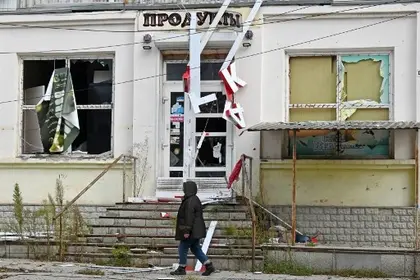The two Ukrainian women sat laughing on a sunny bench during a day-long lull in Russian shelling and argued about what it feels like to be in a war.
The ruins of their village of Bilozirka stretched along a rutted road beyond which lay trenches and artillery pieces locked in Ukraine’s battle for Kherson.
JOIN US ON TELEGRAM
Follow our coverage of the war on the @Kyivpost_official.
The Russians have been firing salvos from the south end of the road ever since being routed and retreating from the village in the first month of war in March.
The Ukrainians have been trying to press a more recent counteroffensive past the Russian positions into areas around the Crimea peninsula the Kremlin seized in 2014.
Anzhelika Borysenko was telling her older friend that anyone could get used to anything — even in a full-scale war that few could believe would break out.
The 20-year-old mother of two had spent March trying not to be noticed by Russian soldiers who set up camp in a school on the opposite side of the road.
She had spent the subsequent months of Russian shelling either hiding in cellars or calculating a safe time to nip out in search for water and food.
“At first, all you thought about was when it would finally end. But now, this feels normal. We got used to it,” Borysenko said of the war.
Natalia Popesko frowned and hinted that her younger friend was missing the point.
“Personally, I feel dead inside,” the 38-year-old said.
“We didn’t get used to it. We simply came to accept that this is real.”

Diane Francis Interviews Mikhail Zygar, Yaroslav Trofimov on Prospects of Russia’s War on Ukraine
Highs and lows
Ukraine’s lightning counterstrike across the north and ever-deeper pushes into the south have created new patches of land that neither side completely controls.
The village of Bilozirka is hidden in one of these destitute grey zones.
Some of Bilozirka’s sturdier residents are returning and Ukrainian troops feel safe enough to use the village as a rear base.
But there is no functioning government or any established means of assistance for the few hundred residents who have filled the village’s better-surviving homes.
The school where the Russians set up their headquarters is now a shattered shell of a building after coming under a whithering Ukrainian assault.
This state of neither all-out war nor any semblance of peace leaves Anastasiya Kuplevska vacillating between desperation and hope.
“If there is no shelling, you wake up and suddenly want to do something,” the 40-year-old single mother said.
“But if they start shooting, you immediately feel helpless again.”
‘Flooded with food’
Kuplevska’s most serious problem is how little she can do on the good days when her spirits are up.
The only village jobs involve selling basics delivered from the nearby city of Mykolaiv.
Most of the local residents worked in a juice factory a drive down the country road.
But the road’s bridges were blown up during the fighting and the side routes are still heavily shelled.
“I don’t even know if it’s still standing,” Kuplevska said of her factory.
She also bristles at offers from well-wishers of what she feels are misguided help.
“They have flooded us with food,” Kuplevska said of the various humanitarian relief programmes.
“But you can’t build a house out of food.”
Will to fight
The debates and complaints in Bilozirka come at a crucial juncture in the war.
Ukraine’s counteroffensive has drawn retaliatory Russian air strikes aimed at leaving much of the country without heat or power heading into the winter months.
Russian President Vladimir Putin appears to be betting that hardship will break Ukrainians’ will to fight.
But months of suffering have had the exact opposite effect on the two women on the bench.
“Many of us had relatives in Russia. We would talk to them. We viewed them as normal people,” Popesko said.
“We view them as animals now.”
The young mother said simply that she refused to talk to her Russian friends.
What Borysenko struggled with more was the very idea that there was a war.
“You see it and feel it and understand that it is true — but you still somehow do not grasp that it is real,” she said.
“You understand it but cannot believe it.”
You can also highlight the text and press Ctrl + Enter






